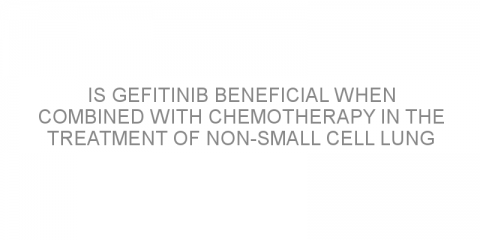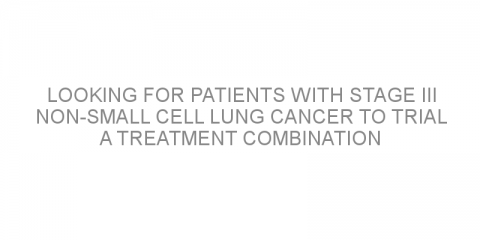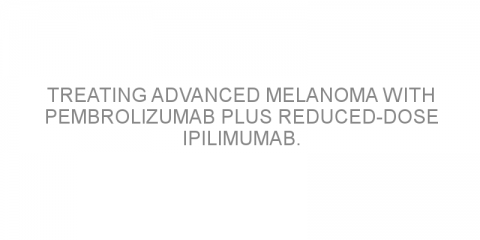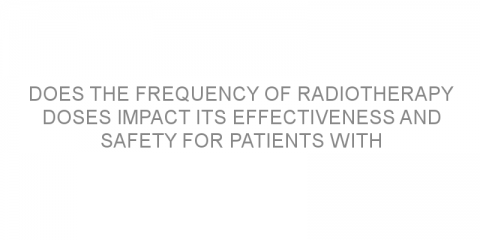In a nutshell This article looked at the effectiveness of gefitinib (Iressa) combined with chemotherapy when compared to a chemotherapy aline in the treatment of non-small cell lung cancer (NSCLC). The authors found that the addition of gefitinib to a chemotherapy increased the progression-free survival (PFS) of these...
Read MoreCurrent stage?-Stage III Posts on Medivizor
Looking for patients with high risk prostate cancer to trial a radiation treatment
In a nutshell This trial is aiming to investigate the effectiveness of stereotactic body radiotherapy (SBRT) boost for the treatment in patients with high-risk prostate cancer (PCa). The main outcome that will be measured will be the quality of life (QoL) of patients. This study is being carried out in Ontario, Canada. The details PCa is the...
Read MoreLooking for patients with stage III non-small cell lung cancer to trial a treatment combination with radiotherapy
In a nutshell This study is looking to examine the effectiveness of durvalumab (Imfinzi) and consolidation stereotactic body radiation therapy (SBRT) after chemoradiation for locally advanced stage III non-small-cell lung cancer (NSCLC). The main outcomes to be measured are the occurrence of side effects and the survival without cancer...
Read MoreTreating advanced melanoma with pembrolizumab plus reduced-dose ipilimumab.
In a nutshell This study was carried out to determine whether combination therapy with a standard-dose pembrolizumab (Keytruda) plus reduced-dose ipilimumab (Yervoy) could be used as a treatment option in patients with advanced melanoma. The study found that this combination had good outcomes and manageable side effects in...
Read MoreCT-guided brachytherapy for elderly patients with non-small cell lung cancer
In a nutshell This study evaluated whether the safety and effectiveness of iodine (I)-seeded brachytherapy (IBT) for the treatment of NSCLC in older people. The study found that CT-guided IBT is an effective and safe therapy and can be considered as an alternative to surgery and radiotherapy for elderly patients with NSCLC. Some background...
Read MoreEvaluating immune-related side effets in patients with advanced melanoma treated with immunotherapies
In a nutshell The study monitored the occurrence of possible immune-related side effects (irSEs) in patients with advanced melanoma under single and combination therapy of ipilimumab (I; Yervoy), nivolumab (N; Opdivo), and pembrolizumab (P; Keytruda). The authors found that combination therapy increases the frequency of irSEs. Some background...
Read MoreDoes pembrolizumab added to chemotherapy before surgery improve the outcomes of patients with early triple negative breast cancer?
In a nutshell The study assessed whether pembrolizumab (Keytruda) could be used in addition to neoadjuvant chemotherapy (NAC; chemotherapy before surgery) to improve the outcomes of patients with early triple-negative breast cancer (TNBC). The study found that more patients treated with pembrolizumab had a complete response. Some...
Read MoreS1-based chemotherapy improves the outcomes of patients with advanced colorectal cancer
In a nutshell This study compared the effectiveness and safety of two different chemotherapies in the treatment of advanced colorectal cancer (CRC). Researchers suggested that S1-based chemotherapy is a good option for the treatment of these patients. Some background CRC is one of the most common cancers worldwide. The standard treatment is surgery...
Read MoreCan oral relugolix be used as androgen-deprivation therapy in advanced prostate cancer?
In a nutshell The study looked at whether oral relugolix (Orgovyx, Relumina) could be used to suppress testosterone in men with advanced prostate cancer compared to leuprolide (Lupron). This study showed that relugolix was associated with more rapid and effective suppression of testosterone levels when compared...
Read MoreCan specialized imaging techniques improve how chemo-radiotherapy is administered in locally advanced non-small cell lung cancer?
In a nutshell This study set out to compare conventional-dose chemoradiotherapy (CRT) to reduced CRT based on 18F-FDG PET in locally advanced non-small cell lung cancer (NSCLC). The investigators found that 18F-FDG PET-based CRT improved tumor control without increasing side effects in these patients. Some background NSCLC accounts for...
Read MoreDoes the frequency of radiotherapy doses impact its effectiveness and safety for patients with localized prostate cancer?
In a nutshell This study examined if the frequency of the same dose of radiotherapy (RT) changed the effectiveness and safety of patients with localized prostate cancer (PC). The results showed that RT that was given weekly was as effective and safe as RT given every other day. Some background Radiotherapy (RT) is an effective treatment for...
Read MoreAdjuvant chemotherapy improves survival of patients with locally advanced rectal cancer
In a nutshell This study investigated the role and optimal dose and duration of adjuvant (after surgery) chemotherapy (AC) in patients with locally advanced rectal cancer. Researchers suggested that this treatment was associated with improved survival in these patients. Some background Colorectal cancer is one of the most common cancers worldwide....
Read More














